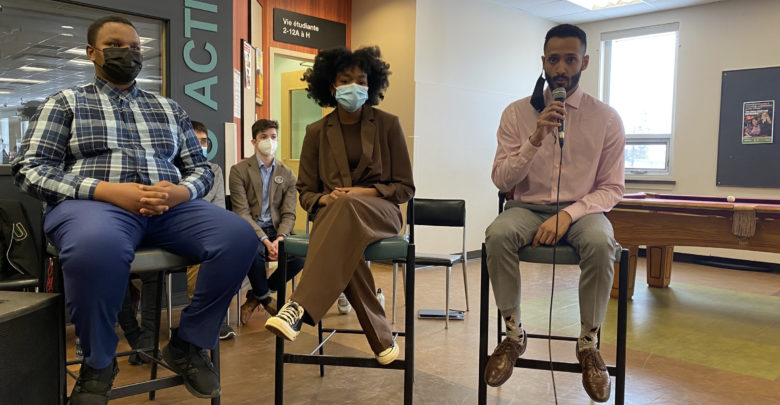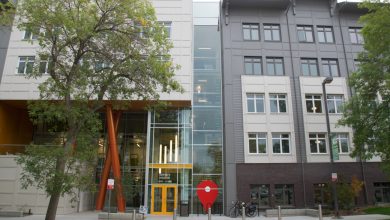 Emily Williams
Emily WilliamsIn this year’s presidential race so far, I find the fresh new ideas that I wanted to see, absent.
Throughout the race so far, candidate Haruun Ali has called himself a “different kind of candidate.” Traditionally, those who run for the Students’ Union president are previous executives who have also sat on Students’ Council for a year or two before that. The other two candidates, Emily Kimani and Abner Monteiro, sat on this year’s executive and certainly fit this mold.
When I had first heard that there would be an outside candidate running who had only been on council for about a month, I was looking forward to hearing fresh ideas that go beyond the status quo. Ali is also a recognizable name as he ran in the municipal election for city council, and I appreciated his presence, bringing the perspective of a young student to discussions, running partly on the concept that he would be Edmonton’s first Black city councillor. However, in his Students’ Union campaign I find myself disappointed, and not seeing the bold promises that I had hoped for.
Each of these presidential candidates’ platforms have significant overlaps, focusing on more funding for sexual violence prevention on campus, fighting Exceptional Tuition Increases with a media campaign in the 2023 provincial election, and exploring for more hybrid options for learning to improve accessibility of the university.
While each of these initiatives are positive and necessary, there isn’t much differentiating these candidates for me.
Emily Kimani, who is our current vice-president (operations and finance) (VP Ops Fi), has a couple platform points that stand out to me as different. Her sexual violence prevention platform is the most extensive by far, promising to renew the outdated sexual violence policy at the U of A, advocate for Campus Climate Surveys (CCS) to be used for better data, mandatory staff disclosure training, and student group support training, including additional supports for students at Augustana.
Kimani also promises to improve the process for event approval — which Monteiro also has in his platform — but she adds to this with a promise to increase grants for student groups by $20,000. However, as someone during the audience question period at Wednesday’s Campus Saint-Jean (CSJ) forum raised, Kimani failed to secure long-term funding for the period equity project this year, and they asked her how she would acquire funding for this. Kimani responded by saying that as the previous VP Ops Fi, “if anybody knows the budget and how much money we can and cannot spend on things, it’s me,” assuring that the promise was tangible — but not really answering the question.
Abner Monteiro was this year’s vice-president (academic) (VPA) and his platform builds off this work, as a continuation. One of his main promises for CSJ is to work towards a bilingual Bear Tracks. This was in his platform last year as VPA, and this was raised by an audience question in the CSJ forum as well. Monteiro responded by saying that just because he hadn’t gotten it done last year, doesn’t mean that he just wanted to give up on it — an answer which I respected, as he was able to own up to what he couldn’t achieve this last year, and strive to do better.
Monteiro’s other main point of difference is on transit safety. This is a legitimate concern for students right now, and the city more generally, and it made it into Monteiro’s platform but not the other candidates. Monteiro says he will work with the Edmonton Student Alliance to advocate to city council for better conditions and safety in our transit stations.
Something that struck me as odd, is that none of the candidates mention opening a new childcare space on campus for students — which was a major platform goal of Rowan Ley, our current Students’ Union president. While this project was originally proposed to open in three years, Ley told me the timeline had been extended. However, none of the candidates currently have it in their platform, which makes me wonder if the idea has been abandoned entirely. This is disappointing to say the least.
Ali, who has branded himself as the “different kind of candidate,” has a few unique ideas in his platform, but they lack the tangible steps that would be taken to bring them to fruition. For example, he says he will get free menstrual products in all campus bathrooms despite the fact that the current pilot program has been unable to find long-term funding. Ali says he will get the university to match funding for the program, but the university is in a state of continuously tightening their belt, and expanding this project to that degree would be massively expensive. It’s a great idea, but the plans for funding do not seem feasible to me.
Ali raised that he is the only candidate to mention expanding the period equity project in his platform in Friday’s residence forum. Kimani, who has been working on the existing program for the past year, responded by telling Ali that the project is “insanely expensive” as is, and that funding needs to be acquired first, before any promises are made about expansion. While Ali has promised to explore fundraising efforts, like an annual gala event, this doesn’t seem like a feasible long-term way to raise enough funds for projects at this scale.
A promise to demand “the university to commit to hiring more academic advisors in their college restructuring plan” is also featured in Ali’s platform. This promise however, makes me wonder how much Ali understands academic restructuring, as the entire point of the initiative was to eliminate administrative staff like advisors, as a cost-saving mechanism for the university. Ali does not explain what he means by this promise, or how he thinks it could feasibly be achieved.
If Ali doesn’t have tangible, bold promises is he really a different candidate? I am starting to think that his status as a different candidate is characterized more by inexperience than bold new ideas. That being said, Kimani’s and Monteiro’s campaigns are largely continuations of their previous portfolios.
Continuing previous work is not necessarily a bad thing, but it is a limitation if it comes at the expense of providing many new ideas. This is an institutional problem that seems to happen each year in the presidential race and it is a disservice to students — especially during a time of crisis at our university — as strong, new ideas are few and far between.
The end result is a presidential race that is far less exciting than I had initially hoped.




